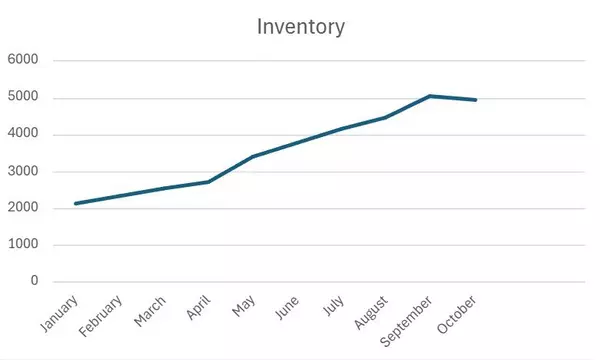
How is your home's listing price determined?
Selling a home involves a series of well-thought-out decisions, but determining the listing price is perhaps one of the most critical. The listing price of your home sets the stage for how quickly it sells. Understanding the factors that contribute to this pivotal number can empower you to maximize your sale price. In this blog, we'll delve into some of the essential elements that come into play when setting the listing price for your property. **Market Conditions** One of the most significant factors that influence your home’s listing price is the current real estate market conditions. Real estate markets can be broadly categorized into a seller's market, a buyer's market, or a balanced market. In a seller’s market, demand for homes exceeds supply, often allowing you to list at a higher price. Conversely, in a buyer’s market, where supply exceeds demand, you may need to be more competitive with your pricing to attract offers. Staying updated on these conditions can be as simple as following local real estate news or consulting with a real estate agent who understands the market's fluctuations. **Location** The timeless real estate adage, "location, location, location," holds true for determining your home’s listing price. Properties in desirable neighborhoods, with access to good schools, lower crime rates, and proximity to amenities such as parks and shopping centers, often fetch higher prices. Being in an emerging neighborhood can also significantly impact your home’s value. Additionally, homes with scenic views or those on quiet streets typically have a higher price tag. **Comparable Sales** Known in the industry as "comps," comparable sales are recent home sales in your immediate area that are similar in size, age, and condition to your property. These sales provide a benchmark, helping both you and potential buyers gauge what is fair market value. Real estate agents often pull comps from MLS (Multiple Listing Service) databases to help you determine the most competitive price for your home. Ignoring comps can result in overpricing or underpricing your property, both of which can cost you time and money. **Condition and Age** The physical condition of your home, along with its age, can significantly influence its listing price. A well-maintained, modern home is likely to sell for more than a similar but poorly maintained or dated property. Factors such as a new roof, updated kitchen or bathrooms, fresh paint, and curb appeal can make your home more attractive to buyers. Conversely, the need for significant repairs can lower your asking price as buyers calculate the cost of improvements into their offers. **Size and Layout** Square footage, the number of bedrooms and bathrooms, and the overall layout play crucial roles in determining your home’s value. Larger homes or those with more bedrooms and bathrooms generally list at higher prices. However, inefficient layouts or homes that lack modern conveniences can detract from this value. It’s worth noting that functional space often trumps sheer size in the eyes of potential buyers. **Economic Factors** Broader economic trends also impact real estate prices. Interest rates, employment rates, and overall economic health can dictate how much buyers are willing to spend. Lower interest rates, for example, mean that buyers can afford to borrow more, often leading to higher home prices. Paying attention to economic indicators can offer insights into how flexible or firm you should be with your listing price. **Professional Appraisals** Many sellers opt for a pre-sale appraisal to get an objective opinion on what their property is worth. Professional appraisers use a range of data points, including market trends, comps, and the home’s condition, to provide an estimate. This appraisal can serve as a valuable tool in setting your listing price and negotiating with buyers. Setting the right listing price involves understanding multiple variables that influence property values. From market conditions and location to the state of your home and broader economic trends, each factor plays a pivotal role. Consulting with a knowledgeable real estate agent can provide the expertise needed to navigate these complexities and arrive at the optimal listing price, ensuring you get the best possible return on your investment. For questions about real estate, contact Ed Black today at (403) 830-8510. Ed BlackREALTOR® Copyright © 2024 All Rights Reserved. This is not intended to solicit buyers or sellers currently under contract with another brokerage.

Can You Predict the Real Estate Market?
The million-dollar question in real estate often revolves around whether one can predict market trends precisely. The short answer is no, you can't. Market information is complex, having multiple variables, and even seasoned experts often grapple with unforeseen twists and turns. Yet, understanding market dynamics and indicators can certainly put you in a better position, whether you're a buyer, seller, or investor. For buyers, the real estate market can feel like a minefield. Prices fluctuate due to various factors: interest rates, employment statistics, and even geopolitical events. While you can't predict the market, you can arm yourself with knowledge. Observe trends over a period, study neighborhood development plans, and evaluate your financial readiness. Consider also the stability of your income and the long-term value of the property you’re eyeing. Historical data shows that housing usually appreciates over time, making it a smart investment, but there's no crystal ball to forecast the perfect purchase time down to a month or year. Sellers face their own dilemma when it comes to timing. Sell too soon, and you might miss out on additional equity. Wait too long, and you risk the market cooling off. Given the unpredictable nature of the market, the best strategy is to be prepared. Keep your property well-maintained, stay informed about local market conditions, and be ready to act when you find favorable conditions. Real estate agents often suggest looking for seasonal trends and buyer demand cycles, but these are based on historical patterns and can’t guarantee future outcomes. In the realm of investing, real estate has generally proven to be a reliable asset class. Whether it's rental properties, commercial land, or flipping homes, the idea has traditionally been to buy low and sell high. However, even the savviest investors can't predict market changes with absolute certainty. Risk management becomes crucial. Diversifying your portfolio, staying updated on market trends, and being prepared for potential downturns can help mitigate risk. Keep in mind that while real estate has historically appreciated in value, there are no absolute guarantees. Market information encompasses a wide range of data points, including economic indicators, consumer confidence, and even natural disasters. These elements interact in intricate ways, so predicting their collective impact on real estate remains elusive. Consider, for instance, the unforeseen surge in housing demand during the COVID-19 pandemic. Few could have anticipated the changes in home-buying behavior influenced by remote work and a desire for more spacious living environments. Another example is the constant shifts in interest rates, set by federal agencies but influenced by global economic conditions, making them difficult to predict for more than short-term projections. While you can't predict the real estate market with pinpoint accuracy. It is important to take steps with preparation and having an informed approach can lead to successful endeavors in real estate. Use available data to make educated decisions, understand your own financial constraints, and consult experts who can offer insights based on historical patterns and economic indicators. Real estate remains a historically good investment, enabling wealth creation and serving as a hedge against inflation. Though it's impossible to predict the real estate market with complete certainty, an educated approach tailored to your role—whether buying, selling, or investing—can certainly tilt the odds in your favor. By staying informed and prepared, you navigate the complexities of the market more confidently and make smarter, well-timed decisions. Real estate, with its historical resilience and potential for substantial returns, continues to be a worthy venture for those who approach it with the right mindset and strategy. For questions about real estate, contact Ed Black today at (403) 830-8510. Ed BlackREALTOR® Copyright © 2024 All Rights Reserved. This is not intended to solicit buyers or sellers currently under contract with another brokerage.

Home Selling Myths: The Facts on Putting Your Home Up For Sale
When it comes to selling your home, one of the most important factors is understanding what's myth and what's fact. Sellers are often faced with excessive advice—some can be incredibly helpful, while others can be downright misleading. Today, let’s unravel some common myths and set the record straight with facts. Here’s the truth about selling your home and how transparency can impact the entire process. **Myth: Spring is the Only Good Time to Sell Your Home** Facts: While it's true that the real estate market tends to heat up in the spring, that doesn’t mean it's the only time you can sell your home. The reality is that homes are sold throughout the year. Factors such as the current market situation, interest rates, and local demand can influence the best time to sell. Even during less "popular" seasons like winter, serious buyers are always on the lookout. So, the myth that you must wait until spring is just that—a myth. **Myth: You Can Sell Your Home As-Is Without Affecting the Price** Fact: Many sellers think they can bypass repairs or upgrades and still get top dollar for their homes. While you can technically sell your property "as-is," the price you fetch will likely be lower. Simple improvements such as updating the kitchen or repainting walls can make a significant difference in your home's appeal and selling price. Transparency about the condition of your home and willingness to make necessary upgrades can increase buyer confidence and often leads to higher offers. **Myth: Pricing Your Home Higher Leaves Room for Negotiation** Fact: Many sellers believe setting a high asking price means they’ll have room to negotiate down if necessary. However, an overpriced home can sit on the market for a prolonged period, making it look less desirable. Pricing your property correctly from the outset is crucial. Overpricing it can discourage serious buyers, whereas competitive pricing can attract multiple offers, potentially driving up the final sale price. Transparency in pricing, backed by a Comparative Market Analysis (CMA), can streamline the selling process significantly. **Myth: Online Estimates are Accurate for Pricing Your Home** Fact: Online valuation tools can be an excellent starting point for understanding your home’s worth, but they are often not as accurate as a professional appraisal. These systems use algorithms based on generalized data and do not account for the unique features and conditions of your home. For a more precise valuation, it's best to consult a licensed real estate agent who can consider local market trends, the condition of your home, and recent sales of comparable properties. **Myth: All Agents are the Same** Fact: Just like any profession, the skills and expertise of real estate agents can vary significantly. Some agents specialize in certain neighborhoods or types of properties, while others might have a broader focus. Choosing the right agent who has a solid grasp of your local market, strong negotiating skills, and a transparent approach can make a substantial difference in your selling experience. Take your time to interview multiple agents and read reviews before making your decision. **Myth: Open Houses and Staging are a Waste of Time** Fact: Open houses and professional staging can significantly impact the selling process. Open houses allow multiple potential buyers to view your home in a low-pressure environment, which can generate interest and lead to offers. Professional staging, meanwhile, highlights your home’s best features, making it easier for buyers to envision themselves living there. Transparent and appealing marketing strategies can enhance the desirability of your home, potentially leading to a quicker and more lucrative sale. Understanding the distinction between myths and facts can make a world of difference when selling your home. As a seller, embracing transparency and making informed decisions can streamline the process, boost buyer confidence, and ultimately lead to a successful sale. Happy selling! For questions about real estate, contact Ed Black today at (403) 830-8510. Ed BlackREALTOR® Copyright © 2024 All Rights Reserved. This is not intended to solicit buyers or sellers currently under contract with another brokerage.
Categories
Recent Posts










